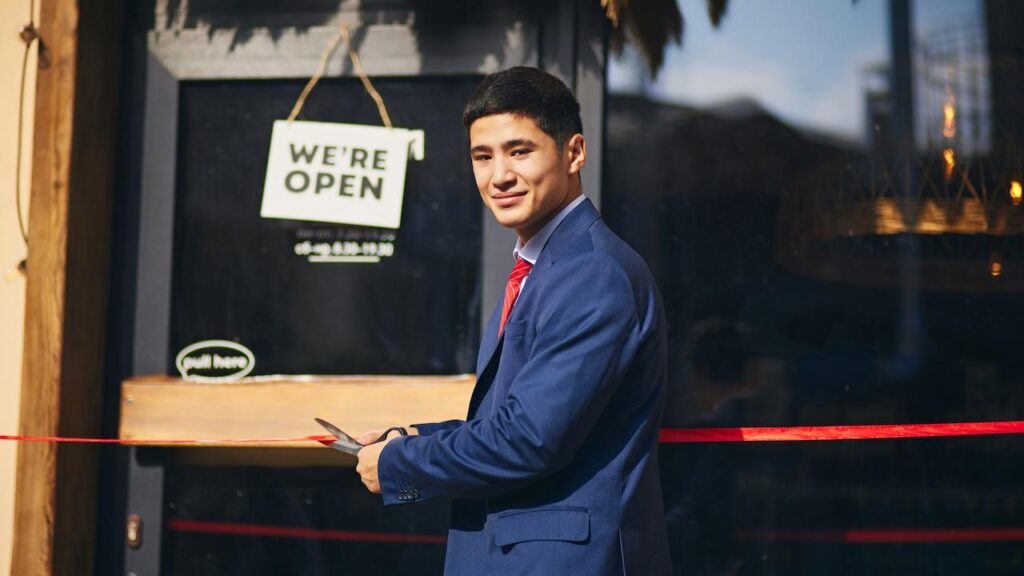New Kids on the Block: Opening a Business in the Face of a Pandemic
Even in good times, opening a business can be a brave endeavor. But doing so during a pandemic is an entirely different challenge. Central Geelong’s entrepreneurs were forced to adapt to the rapidly changing environment and navigate unexpected difficulties when their dream of starting a business came true. These brave entrepreneurs have come up with some extraordinary solutions, from rethinking their marketing strategies to changing business models. Their resilience and innovative thinking helped them overcome the obstacles and find new ways to succeed.
In a normal year, owners of businesses would host grand openings, inviting family, friends and local residents to celebrate the beginning of their business. But 2020 was not an ordinary year. Many of the traditional celebrations were either canceled or completely redesigned due to lockdowns and social distance measures. Staffing and training for new businesses was also delayed as employees had to adapt to the new conditions of work or their start dates were postponed. The pandemic forced those who already had a brand and a customer base to change their strategy and approach in order to survive.

New Kids on the Block
Impact of Reduced Foot Traffic and Remote Working
Central Geelong’s new businesses faced a sudden drop in foot traffic. The 30,000+ Central Geelong residents are a large part of the daily customer base for many businesses. As the COVID-19 crises unfolded, however, many large employers in the area, including WorkSafe, Deakin University and Barwon Water, shifted to remote-working models, reducing the number of students and office workers moving through the city every day.
The number of customers in restaurants, cafes and shops who relied on office workers dropping by for quick lunches and after-work shopping has decreased. To protect both customers and employees, many businesses in Central Geelong had to temporarily close or switch to an online-only model. Communication with customers became easier for businesses that already had an online presence. Customers could be contacted to offer new products or services while still maintaining their relationship with the business.
New businesses faced a more difficult task. The new businesses had not yet established a customer base, and the pandemic was making it more difficult to attract customers.
Innovation and Adaptation in the Face of Adversity
Many new businesses have adapted quickly to this new reality despite these challenges. As an example, A Natural Bunch a florist on James Street opened its doors April 2 just as other businesses in the area were closing. Due to the reduced foot traffic caused by the pandemic the store switched to an online-based model. Customers can order their products via the website, and contactless delivery is available. A Natural Bunch is a retailer that specializes in DIY Terrarium Kits and potted plants. They also offer bouquets to suit any occasion. The store promoted its online services in the run-up to Mother’s Day to ensure that customers could shop from home.
The shift from traditional retail to online shopping was crucial for many companies. Retail models that relied on people coming into the store had to be reinvented. Businesses began to offer contactless payment methods and home delivery as restrictions on in store shopping increased. Foreverness Bridal adapted quickly its traditional bridal business to fit the pandemic. The Bridal live appointment allowed brides to stream their fitting sessions so that family and friends could be included in the experience, even if they lived miles away. This innovative method allowed brides and their loved ones to experience the same exciting moments while still receiving expert guidance.
Takeaway and Online Ordering: Dining Out
To stay afloat, restaurants and cafes that relied heavily on dine-in clients were forced to make a quick pivot. Stacked Pancake & Dessert Bar which opened on Yarra St in May was severely affected by the restrictions as they could not serve pancakes inside. They began offering take-out items such as cheesecakes, puddings and cheesecakes. The bakery also offered free delivery in Geelong and next-day cake delivery if orders were placed before 2pm. This shift kept the business running while they waited until restrictions eased and they could reopen for in-store eating.
Similarly, Parma Bar which opened a month before in March, has adapted to the new situation by offering delivery, takeaway, and kerbside pickup. The menu, which was traditionally based on parma, was reimagined to cater for takeaway customers.
In many new cafes and restaurants, the shift to a takeaway-model also meant that they had to make adjustments in terms of how orders and payments were made. Customers were encouraged to use contactless payment methods and online ordering became commonplace. This change not only improved the safety of both customers and employees, but also created new growth opportunities in an increasingly digitalized world.

Virtual Services and Online Consultations
Virtual Services and Online Consultations
A new business faced another significant challenge: adjusting their service offerings without face-to-face interaction. Virtual consultations were an immediate necessity for professional services, such as consultants, health providers and other service-based companies. Health professionals such as physiotherapists, psychologists and others quickly adopted Telehealth to continue providing remote support for their clients. Online platforms like Zoom, Skype and Teams have become the main method of communication for businesses, allowing them to maintain continuity and keep both their staff and clients safe.
Pinot & Picasso is a creative studio that specializes painting classes. It faced a difficult challenge because its business relied on in-person sessions. Before the pandemic, clients would get together for a fun night of wine, food and painting. After the pandemic, the business offered online art lessons and delivered art boxes to the customers’ homes. The art boxes included all supplies needed for the online classes, so people could still enjoy the fun of creating art without being socially isolated. This pivot helped Pinot & Picasso not only survive, but also opened up a new revenue source that can continue long after the pandemic subsides.
Health and Safety Measures : Modifying business practices
New businesses had to adapt their physical space to meet new safety and health requirements. Retailers, for example, had to change their store layouts in order to create a sense of social distance. Some offered doorway service, where customers could pick up their orders at the door after placing their orders over the phone or online. Many businesses have installed hand-sanitizing stations near the entrances to comply with hygiene standards. Customers are required to wash their hands before entering.
Businesses that did not offer contactless payment methods before, quickly implemented tap and go options in order to reduce physical contact. Cash transactions have become less common as customers and business owners prefer safer digital alternatives. Counter shields have been installed at many registers to protect both customers and staff.
Marketing Strategy: Adapting for a Digital World
Traditional marketing strategies needed to be reimagined as businesses changed their business models. Virtual promotions replaced in-store promotions that were once the mainstay of growth for businesses. Social media was used by many businesses to reach out to their audience and offer promotions, competitions and special offers. Word-of mouth marketing, previously reliant on face-toface interaction, has moved online. Platforms like Instagram, Facebook and Google Reviews have become key tools to attract and retain customers.
As an example, Good Folk Yoga a new studio of yoga in Central Geelong quickly adapted to the online classes offered by Zoom. The studios promoted their services through social media and gained a large following, despite the fact that they were unable to operate from their physical location. Businesses like Curls and Swirls also used social media to market their products and services, while still adhering public health guidelines.
Why it is important to support local businesses now more than ever
Local customers’ support is more important than ever as these businesses adapt. Every small step counts, whether it is shopping locally, following local businesses on social networks, writing reviews or spreading the news about good products and services. You’re supporting local business owners and contributing to the economic health of your community by choosing to shop locally. Local businesses offer unique experiences, personal service and a sense connection in the community.
Central Geelong’s businesses have shown resilience in the face adversity. Their ability to adapt and invent in response to pandemics has been a testimony to their strength. These businesses will continue to offer essential services and exciting new products as the region recovers. They also contribute to Central Geelong’s vibrant atmosphere.

Future of New Businesses Central Geelong
Future of New Businesses Central Geelong
Central Geelong’s newest businesses proved that despite the challenges they faced, with creativity and adaptability it was possible to survive even during the toughest times. These businesses will continue evolving as restrictions are eased and the city slowly returns to normal. They will offer a mix of online and in-store experiences to appeal to a wider audience.
Central Geelong’s newest businesses can help you with whatever you need. Whether you are looking for a cafe to visit, a gift to give to someone special or a professional to assist you, Central Geelong’s newest business is ready to help. You can help build a more resilient and stronger community by shopping locally and supporting new businesses.

